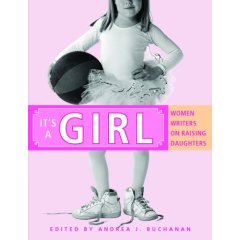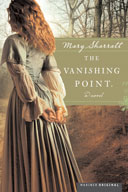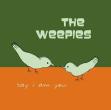
The blog book tour for Andi Buchanan's pink book
, It's A Girl, stops here at ReadingWritingLiving today.
I have to admit having a lot of mixed feelings about this book. The biggest feeling is frustration and regret that I don't have a piece in it. I have two girls. I'm a writer. I had multiple deadline extensions, and a warm invitation from the editor to submit something. I tried. I really did. But I could not, for the life of me, pull anything together for the final-final-final deadline. When we received our copy of
It's A Boy, my daughters were excited to see my name in the table of contents, and they eagerly asked when
It's A Girl would be released. I had to sheepishly tell them that I wouldn't have a piece in the companion book.
Why not? As I read through the wonderful, provocative essays in
It's A Girl, I noted that most of the writers had daughters who were a lot younger than my preteen and teenager. I wrote a lot more about mine when they were smaller, but seemed to pretty much stop when the older was about seven or eight. Things started getting a lot more complicated, and it was hard - no - impossible - to write about them when we were in the midst of living our entangled, messy, rollercoastery lives. During the period that submissions were being considered for
It's A Girl, my older daughter was a high school freshman, and I was feeling more conflicted and insecure as a parent than any time since the day she was born. My writing tongue was tied.
I feel like we're a bit more out of the woods now (rushing madly to knock on wood), but it's still hard to write about them. They're intensely private people now, and I don't feel like I could write anything meaningful that they would really want me to share with the world; but I wouldn't want to write anything superficial. So the book has come out, and I'm not in it, and I feel sad about that, but that's the irony of it: it was a lot easier to write about a ghostly boy-who-never-lived, than two flesh and blood girls.
Having said all that, let me get to the writers who DID submit their essays to this book. Given where I am in my mothering process, I have to admit that I gravitated strongly to the essays written by mothers of older daughters (preteen and beyond). I appreciated the reflections about little girls, but that feels like a far-off planet I used to live on, but won't be visiting again anytime soon. I was fascinated and very interested in the writers who were able to do what I couldn't.
Ann Douglas' essay, "The Food Rules," is powerful and chilling, about her own and then her daughter's struggles with food. This sentence made my stomach cramp and my eyes fill with tears:
Maybe I shouldn't have been surprised on that late June evening during my daughter's eighth grade year when I was looking in her closet and I came across a jumbo -sized candy container filled with vomit.
Let me tell you, that got my attention way more than musings about the pros and cons of Barbie. But a lot of the essays were poignant struggles over the messages about beauty that we absorb, that we carry ourselves, and pass on to our daughters. Joyce Maynard's piece, "The World's Most Beautiful Baby- Take Two," about her obsession with her daughter's beauty, and her dismay when she grew a "Frida Kahlo mustache" is brutal-honest in its self reflection.
Here is the worst shame for me: That when my daughter wasn't beautiful - and sometimes she wasn't - I grieved the loss of her beauty more than I grieved the appearance of lines on my own face, or my graying hair...
Of course I was transfixed by Jennifer Lauck's essay, "Links," because she writes so beautifully about being adopted, and what it means to give birth to a baby girl after losing the connection to her own first mother. It choked me up.
Perhaps she is dead.
Perhaps she forgot.
Perhaps she never wants to remember.
I gave up thinking about her at all. You can't live your life staring at the telephone.
I also loved Gayle Brandeis' story of her daughter embracing Buddhism, ("Zen Mind, Daughter's Mind"). I barely understood much of the terminology in Leslie Leyland Fields' "Passing It On," about her teenaged daughter being the only woman doing commercial salmon fishing on a boat in Alaska (what's a tender? what's a skiff? I wondered, in awe), but it made me feel excited and impressed.
I pray for her what she has not dared: the courage to be weak, the courage to ask for help, to cry when she needs to, to bleed when she must, to work beside men as a woman.
I guess this is the kind of writing that inspires me the most now, about navigating that difficult passage of seeing a daughter grow up and become her own person.
But there's something in this book for everyone, whether you've just given birth to a girl last week, or yours is well on the way to growing up. It's a rich, poignant mix, and a great addition to the world of family literature.
















